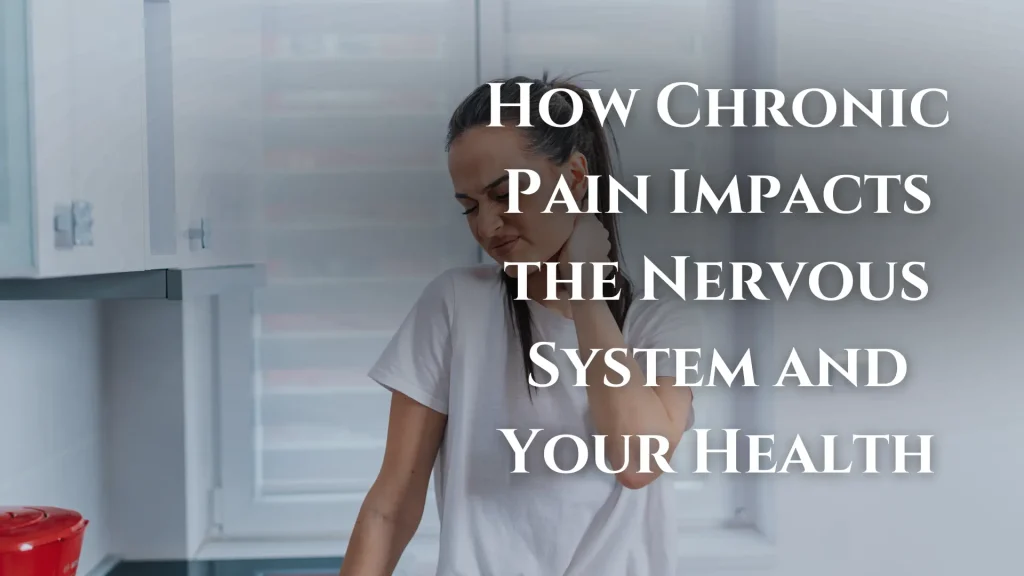
If you experience chronic pain, you’ll undoubtedly know how much it can affect your daily life. When your pain flares up, it may make it difficult to work or engage in recreational activities. However, what you may not know is how chronic pain affects the nervous system and your overall health, often leading to long-term changes that go far beyond the original injury.
Suffering through chronic pain can negatively impact your health in other ways, which is why it’s essential to seek treatment.
What Is Chronic Pain?
Chronic pain refers to any pain that lasts for more than three months, regardless of whether it’s constant or intermittent. According to a recent study from the Centers for Disease Control and Prevention (CDC), an estimated 20.9 percent of adults in the United States experience chronic pain in some form.
Common Types of Chronic Pain
Chronic pain can come in several forms, including aching, burning, and sharp pain. The type of pain you experience may depend on where the pain originates in the body and the type of injury that initially caused it.
For example, those experiencing chronic back pain may report an aching pain accompanied by a squeezing sensation. Those experiencing chronic pain in their extremities related to tendon and ligament injuries may report more burning or shooting pain, which are common symptoms when asking, What is chronic pain in the nervous system, and how does it manifest?
Chronic pain can also include the following:
- Lower back pain
- Upper back, neck, and shoulder pain
- Headaches and migraines
- Joint pain caused by tendonitis or arthritis
- Muscle pain caused by strains or conditions like fibromyalgia
- Neuropathic pain caused by nervous system malfunctions
If you experience any of these chronic pain conditions, it could also be impacting your nervous system and overall health.
Chronic Pain Causes
Chronic pain can have many different causes, depending on the type of pain you experience. Your pain may originate from your nervous system itself, or in soft tissues like muscles, tendons, and ligaments, or internal organs. Some of the most common causes of chronic pain are:
- Traumatic injuries, such as those sustained in a car crash or a slip and fall, that cause nerve damage or inflammation that puts pressure on your nerves
- Repetitive stress injuries are caused by repeating the same motions over and over, such as if you have to repeatedly bend over and lift objects as part of your work duties
- Severe stress from work or other aspects of your life, which can have physical consequences, including chronic pain
- Genetic medical conditions, including certain types of arthritis
- Age-affected wear on your joints from decades of use
How Chronic Pain Affects the Nervous System
The nerves that make up your nervous system are spread throughout your body, with the central nervous system located in your spinal cord and brain. When you experience pain, these nerves are firing, telling your body something is wrong.
When individuals experience chronic pain, it can change how their nervous system handles its pain response, resulting in a condition known as central sensitization. This condition causes those affected to become more sensitive to pain, increasing the severity of the pain they experience over time.
Another nervous system condition caused by chronic pain is peripheral neuropathy. This condition primarily affects the extremities, with symptoms including tingling, numbness, or pain in the arms, hands, legs, and feet.
Because your brain is part of your central nervous system, chronic pain can also affect it. Those experiencing chronic pain may develop depression or other psychological conditions that negatively impact their life.
Managing Chronic Pain’s Effects on the Nervous System

The first step of managing chronic pain and its effect on the nervous system is identifying its cause.
Medical imaging devices, including MRIs and X-rays, may help identify injuries that cause chronic pain and its alternatives. However, many chronic pain conditions don’t show up in these images. Instead, pain management professionals often ask questions about your level of physical activity, where your pain originates in your body, how it spreads, and its severity and consistency.
Once the cause of your chronic pain is identified, there may be several treatment options available to you, including:
- Physical therapy for musculoskeletal injuries
- Medications that can reduce inflammation or suppress your nervous system’s pain response
- Lifestyle changes, including getting more active or choosing healthier food and drink options
- Surgery, which is often a last resort if other treatment options can’t or don’t work
Contact Our Jersey City Pain Management Professionals
Contact AllCare Health & Pain at 201-386-9800 to schedule an appointment with one of our pain management professionals today. Our team will identify the cause of your chronic pain in New Jersey and develop a treatment plan to reduce or eliminate it to help you.

